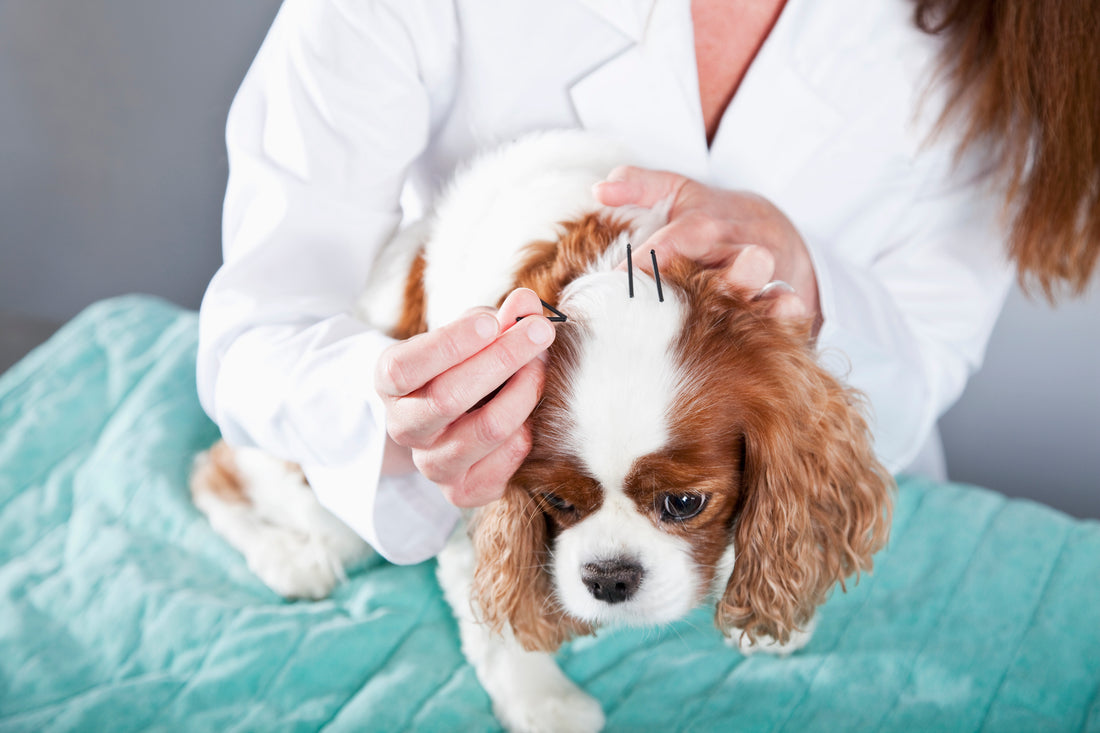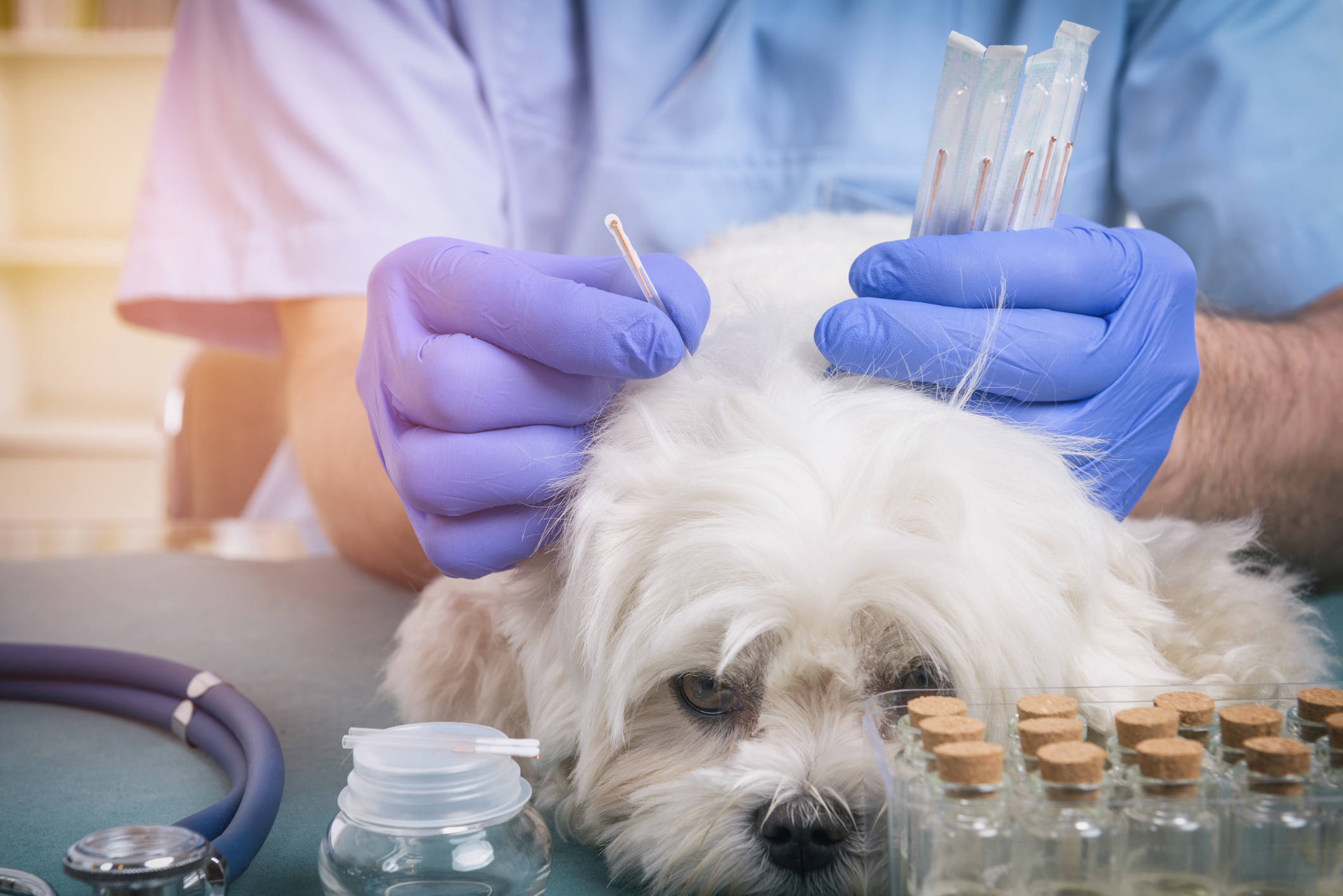
Pricked and Poked for Health: What is Veterinary Acupuncture?
Acupuncture, the use of strategically placed needles on the body, is a popular treatment used by humans to assist in pain relief and relaxation. But did you know that this practice can also be used on our four-legged friends?
Veterinary acupuncture is a growing practice among holistic and integrative veterinarians because of its non-invasive nature and proposed benefits for pets. If your pet is suffering from chronic inflammation or pain, veterinary acupuncture might be a useful contribution to their treatment plan.
What is acupuncture?
Veterinary acupuncture is an aspect of traditional Chinese veterinary medicine and has been used on humans for thousands of years. In this practice, it is believed that acupuncture helps the body heal itself by correcting and maintaining proper energy balances.
The method on animals is quite similar to acupuncture for humans. Trained veterinary specialists insert superficial needles into your pet’s skin where groups of nerves and blood vessels meet. These locations are called “acupuncture points” and are strategically targeted to produce particular results like pain and inflammation reduction.

Acupuncture is a treatment, not a cure, for a variety of health problems. These problems are usually chronic or incurable; therefore, veterinary acupuncture is often used for pain relief and to improve quality of life in animals. It is typically used alongside other treatment methods and can work synergistically with other traditional Chinese veterinary medicine treatments, as well as conventional western treatments.
Veterinary acupuncture might also be used alongside similar methods during a session, including acupressure, which applies pressure to acupuncture points without the needles, or moxibustion, which applies heated herbal compounds to needles for a stronger acupuncture effect.
Treatment sessions for acupuncture typically last between 10 and 30 minutes. When your dog or cat begins acupuncture treatment, it is recommended that they be treated at least one to three times a week for a few weeks. After that, they may benefit from less frequent, but consistent, treatments.
Potential benefits of acupuncture
While every pet’s needs and treatment plan will be different, depending on their underlying health problems, acupuncture may be able to provide a specific set of benefits in pets large and small.
- Overall pain reduction: Acupuncture stimulates the body to release natural anti-inflammatory and pain-relieving chemicals or hormones, helping to reduce discomfort in cats and dogs.
- Relaxation of the body: Needles are placed strategically to both relax the muscles in the immediate location and, by extension, other muscles and body parts by relieving cramping or spasms. This can also assist in pain relief and calm pets.
- Assist in healing: Acupuncture helps improve blood flow throughout the body, helping to deliver more nutrients and oxygen to tissues to help them heal and strengthen. Simultaneously, the practice may help flush out waste and toxins.
- Stress relief: Pet parents often worry that their furry friend will be agitated by treatments involving needles. However, in many cases, acupuncture produces stress- and anxiety-relieving effects, helping to soothe existing anxiety disorders and even putting pets to sleep during their treatments.
Additionally, acupuncture is a wonderful treatment option for a wide range of pets for even more reasons:
- Is good for pets in all stages of life: Unlike some medications, which pose a threat to the development or overall health of pets in some stages of life (like young puppies or very old pets), acupuncture may be beneficial to pets regardless of age.
- Does not interfere with medications: Acupuncture is non-invasive and will not interfere with medications or supplements your pet is taking for their health problems. This makes it a great alternative treatment to use alongside more conventional methods for synergistic effects.
- Is safe and harmless: Acupuncture does not pose adverse side effects and is safe and pain-free for most pets. This means you don’t need to worry about complications regarding your pet’s organs or bodily systems after repeated acupuncture treatments. Although some animals may experience lethargy for around 24 hours after treatment, this symptom should pass on its own.
Uses for veterinary acupuncture
Almost all pets could benefit from acupuncture in some way throughout their life. However, the practice is most often used for pets experiencing chronic pain or other health problems that are incurable or difficult to manage.
- Cancer: Pets with cat or dog cancer may benefit from acupuncture as an alternative treatment alongside conventional treatments like surgery or chemotherapy. Thanks to the potential healing and pain-relief properties of the practice, acupuncture may improve your pet’s quality of life as they battle their disease.
- Arthritis: Pets with arthritis may experience reduced inflammation and improved mobility and comfort due to acupuncture’s ability to produce natural painkillers and anti-inflammatories.
- Trauma or injury: After a painful injury or bodily trauma, acupuncture may help relieve pain and even promote healing in your pet’s body. Acupuncture may also be useful after surgery to help the pet’s body recover more comfortably.
Some anecdotal evidence suggests that veterinary acupuncture may even be useful for pets with allergies, gastrointestinal problems and asthma.
Acupuncture is a powerful medicinal practice that has the potential to offer pets a range of benefits. However, remember that acupuncture should only be administered by a trained and licensed veterinarian. You should never attempt to perform acupuncture on your pet at home. By relying on the expertise of a trained professional, your pet may experience symptom improvements in just a few weeks!


